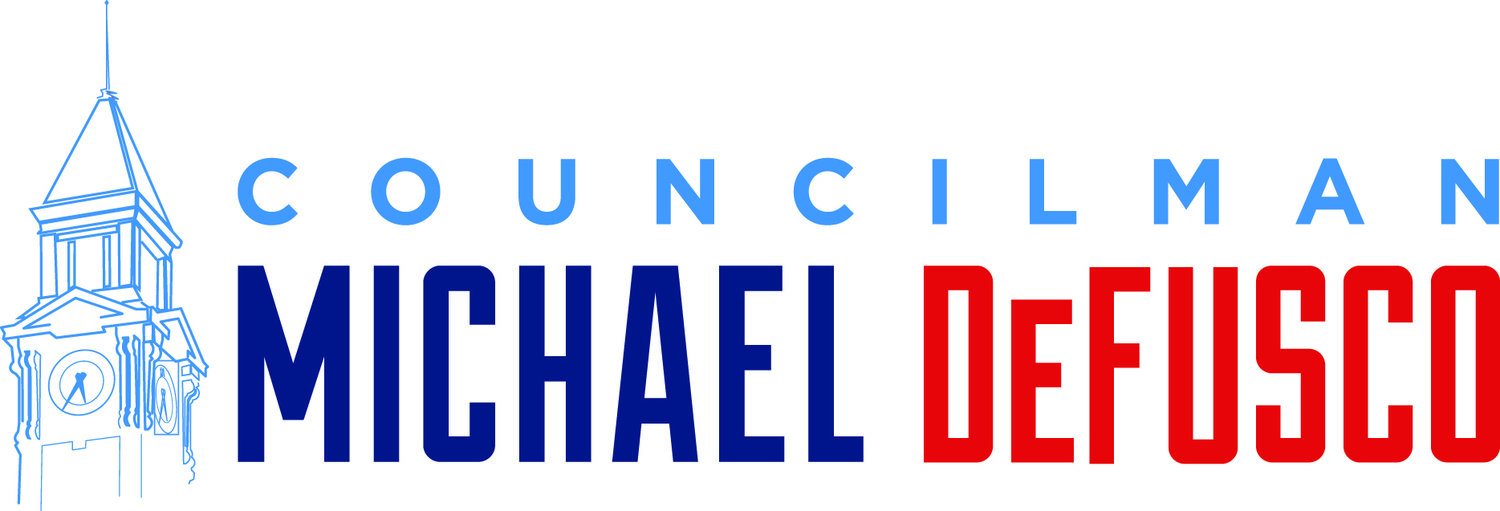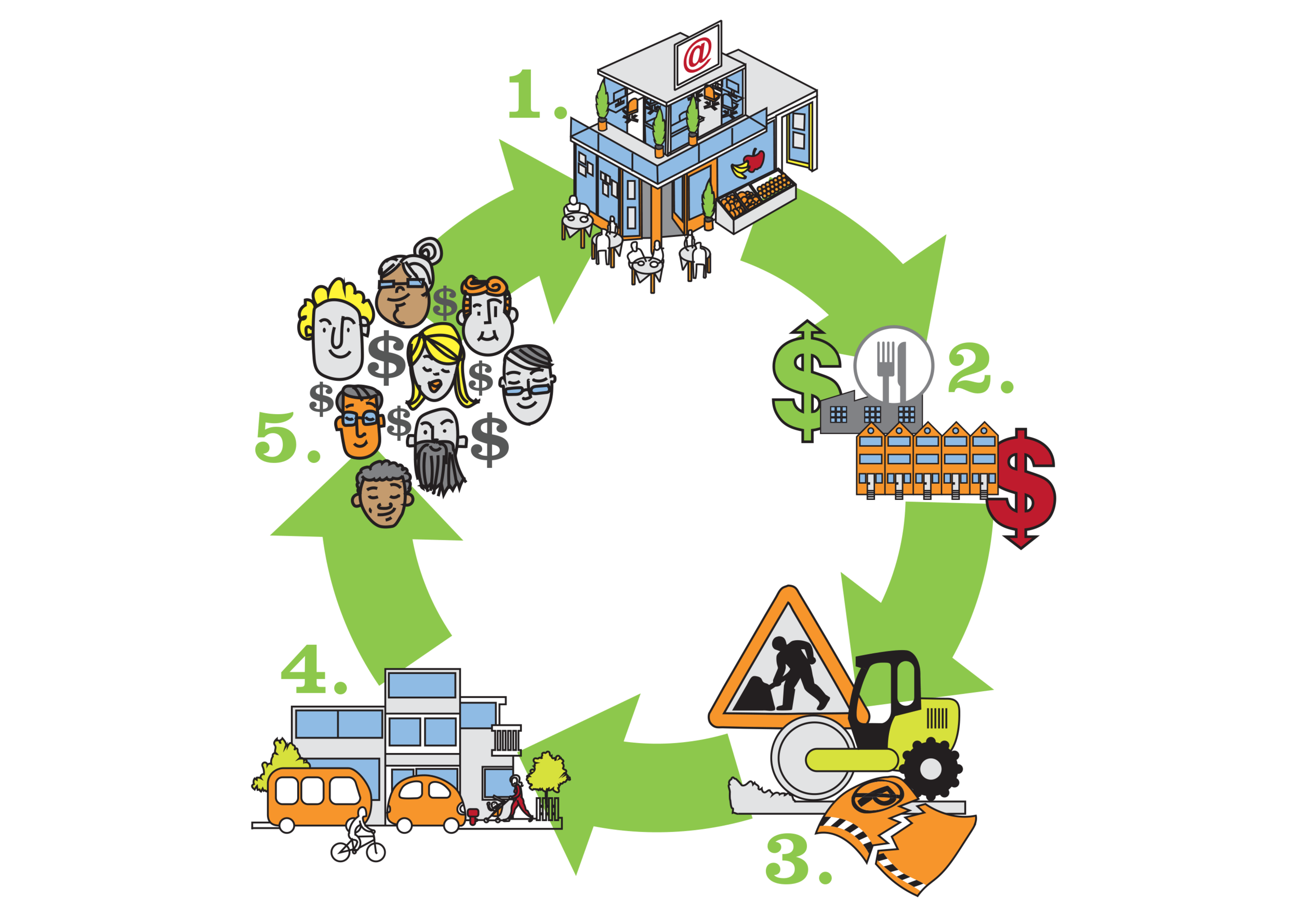INCENTIVIZING SMALL BUSINESSES AND PUTTING WASHINGTON STREET BACK ON THE MAP
Successful small businesses are part of what makes Hoboken a great place to live. Residents want to be able to walk to neighborhood coffee shops, restaurants and stores, and commercial businesses add to our tax base and reduce the burden on residents. Unfortunately, many small businesses are struggling to succeed in Hoboken due to high costs and lack of opportunities, preventing the mom and pop shops and corner stores that create vibrant neighborhoods from taking root. Mike DeFusco has a plan to encourage more small businesses to open in Hoboken, and it starts by looking at Washington Street, our main commercial street.
Modernizing Hoboken’s Zoning Map -- Especially on Washington Street
When a new business wants to open in Hoboken, they need to abide by the city’s Zoning Map which controls what type of businesses are allowed to open in different areas. Hoboken’s zoning map dates back to the 1980s and has not been significantly updated in decades, and this is holding businesses back from thriving. Many residents may not realize that Washington Street north of Fourth Street is zoned exclusively residential. This means that an entrepreneur interested in opening a new cafe or retail store in that area can’t do so without first appearing before an unelected, bureaucratic board -- a process that can cost thousands of dollars with no guarantee of success.
Mike DeFusco will modernize Hoboken’s zoning map to incentivize innovative new small business and will provide a road map so entrepreneurs know exactly where they can locate their businesses and how they can succeed. He’ll cut the red tape and high costs that too often stifle businesses in the Mile Square.
Increasing Commercial Tax Revenue to Fund Major Priorities
Small businesses create more vibrant neighborhoods, but they also have another crucial benefit -- they pay property taxes, allowing the city to fund important priorities and reduce the burden on residents. This is all part of the DeFusco Team’s comprehensive strategy to solve problems and innovate for Hoboken’s future. Funding for major initiatives like infrastructure improvements, recreation facilities like a community pool, investments in our education system, and many other ideas will be generated from bringing more small businesses to Hoboken.
More Corner Stores and Mom and Pops
Our busy corners are the perfect place to open a coffee shop, pharmacy, deli or other neighborhood business, allowing nearby residents to buy what they need just steps from their front door. But Hoboken’s current zoning scheme makes it too difficult for these stores to open, and in many cases filling our corners with ground floor residences, storage units and other uses that do not contribute to vibrant neighborhoods.
Mike DeFusco will encourage more mom and pop shops to open on our corners, unlocking opportunities for businesses to thrive and to contribute more to our tax base, reducing the burden on residents.
Pursuing Innovative New Uses
Innovative new business concepts are thriving in cities across the country where makers, creators and innovators are being allowed to breath new life into old warehouses and industrial areas. But it hasn’t happened in Hoboken, because our city doesn’t think creatively about how to adaptively repurpose our industrial past. Mike DeFusco will work to attract innovative new businesses like urban wineries, coffee roasters, breweries and tech co-working spaces to areas like the northwest that are filled with exactly the kind of spaces these businesses are using in other cities. These new businesses will help Hoboken become a destination for creative entrepreneurs looking for a place to create the next big thing.
CORNER STORES CAN FILL POTHOLES.
IT ALL WORKS TOGETHER.
Throughout this campaign, we’ve presented a lot of big ideas — modernized parking garages with real-time availability of spots, a seasonal dome over the field at 1600 Park and a European-style market at the train terminal, just to name a few. These are certainly exciting ideas but the question I hear a lot is “how are you going to pay for it — raise taxes?” Absolutely not. We’re going to stabilize taxes by creating new revenue sources for the city that aren’t on the backs of residential taxpayers, and without negative streams like the $6.5 million we generate from parking tickets.
I’ve served in municipal government for seven years, both on the city council and zoning board, but I also work for a Fortune 500 company in the private sector, managing multimillion dollar budgets and a large team. I know how to make Hoboken work better, to deliver the 21st century model of a city that Hoboken can become.
We’ve seen unbridled and poorly planned residential development over the last ten years, resulting in more strain on our infrastructure without essential investments being made to our streets. When we do make repairs we resort to bonding, or borrowing money — to the tune of $130,000,000 over the past nine years, an 88% jump in debt. This needs to stop. We need to cultivate an economic ecosystem that prioritizes the things neighborhoods need. We need to inspire a new local economy by attracting tech co-working spaces and startups, invite innovative land uses like urban wineries and distilleries and incentivize more mom and pop shops that neighborhoods need, which in turn all generate revenue for the city to use for infrastructure repairs. It all starts with updating our massively dated zoning code, which hasn’t been altered since the mid-1980s.
When done right, smart, holistic land use decisions can create this positive economic ecosystem, with each piece of it reinforcing the others and the entire city progressing together. That’s our vision for not only how we pay for our new ideas, but how we make Hoboken work better for residents. Just look at Chelsea Market in NYC -- the government didn’t pay for it, they planned it and now benefit from a unique destination and capitalize on all the tax dollars, too. The same thing is happening in Downtown Jersey City, where zoning was changed to encourage more restaurants.
I know zoning isn't exciting, so I’ve put together an infographic showing how we can create revenues for the city to invest in infrastructure and quality of life, all without burdening residential taxpayers. The steps we will take below correspond to a number on the graphic.
How coffee shops, tech incubators and mom and pop shops can fix potholes, reduce residential taxes and create the future Hoboken needs:
1. Incentivize New Small Businesses
We need to update Hoboken’s outdated zoning laws and remove the oppressive bureaucracy that is stopping businesses from opening in our city, and making it harder to succeed once they are here. For example, right now you can’t open a restaurant on Washington Street north of Fourth Street without appearing before an unelected board, something that needs to change. These changes will incentivize more corner stores and mom and pops, creating new tax revenue and more vibrant neighborhoods. We will also work to attract innovative new businesses by creating a regional tech-hub, a place where innovators, thinkers and entrepreneurs can thrive, as well as a European-style market at the train terminal and spaces for new business models like coffee roasters, urban wineries, hydroponic gardens and tech co-working spaces.
2. Reduce the Burden on Residents with More Commercial Tax Revenue
These changes in our city’s zoning law and our approach will help thriving new businesses emerge throughout Hoboken, creating an increase in commercial tax revenue. This outcome will allow the city to reduce the massive financial burdens faced by our homeowners and renters. A lower tax burden makes the city more affordable, allowing longtime residents to stay in their homes with less fear of being pushed out by rising prices.
3. Allocate Resources to Fix Road and Water Infrastructure
Additional tax revenue will allow the city to re-prioritize solving everyday quality of life problems like filling potholes, fixing broken sidewalks, cleaning dirty streets and enforcing noise violations. This will improve quality of life for all residents. At the same time, new public-private partnerships and a dedicated infrastructure fund for all new developments will create major investments in our water and sewer systems, reducing neighborhood flooding, and in our roads to reduce traffic.
4. Make Our City a Better, More Vibrant Place to Live
Solving pressing quality of life problems will allow the city to widen its scope to address issues like modernizing the recreation department, creating additional parking, improving public transit and reducing traffic. Fixing these long-term problems that haven’t been solved in decades will create a sense of confidence and forward momentum for our city.
5. Help Families Stay in Hoboken for the Long Term
Making investments in the most important area of all, public education, will help families stay in Hoboken. We can build improved school facilities through innovative public-private partnerships to upgrade our existing K-8 school facilities to allow for high-tech programs like STEM education, computer coding and much more, and we can start planning on a new state-of-the-art public high school complex that our community deserves.
6. A Better Environment for Small Businesses
With more families staying in Hoboken, there is more demand and support for local businesses, which encourages even more of them to open here and creates additional tax revenue.




